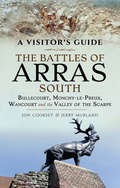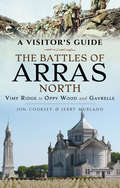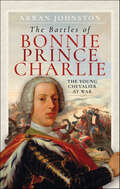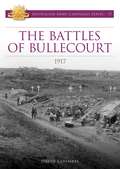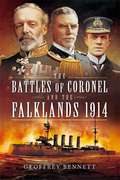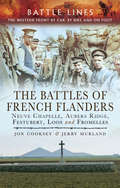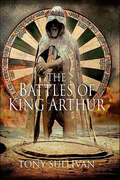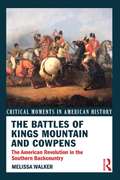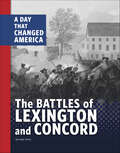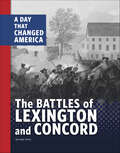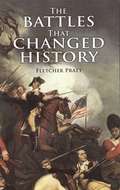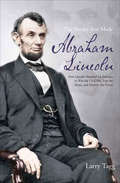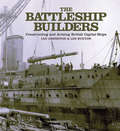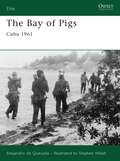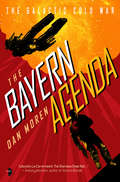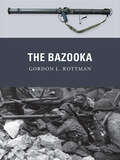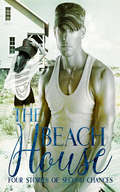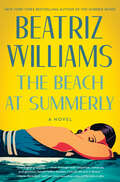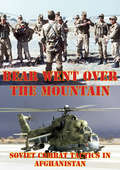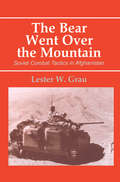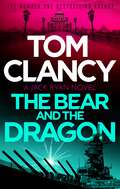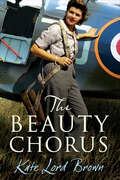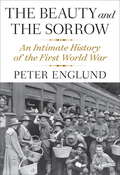- Table View
- List View
The Battles of Arras: Bullecourt, Monchy-le-Preux, Wancourt and the Valley of the Scarpe (A Visitor's Guide)
by Jon Cooksey Jerry MurlandAn illustrated and informative guide to the WWI battlefields south of Arras, France, including some of the most significant battles of 1917.Some of the most famous and frequently visited battlefields on the Western Front are just to the south of the Arras. These sites include Battery Valley and Observation Ridge, Telegraph Hill, Monchy-le-Preux, Wancourt, and Bullecourt. And this clearly written, highly illustrated guide is the ideal introduction to them.Expert guides Jon Cooksey and Jerry Murland have devised a series of routes that can be walked, biked or driven, explaining the fighting that occurred at each place in vivid detail. They record what happened, where it happened and why, pointing out the sights that remain for the visitor to see. The featured itineraries allow visitors to trace the course of each battle across the modern landscape, gaining visceral insight into the nature of combat throughout the war.
The Battles of Arras: Vimy Ridge to Oppy Wood and Gavrelle (A Visitor's Guide)
by Jon Cooksey Jerry MurlandThe First World War battlefields to the north of Arras – including Vimy Ridge – are among the most famous and most visited sites on the Western Front, rivaled only by those around Ypres and the Somme, and this clearly written, highly illustrated guide is the ideal introduction to them. Visitors can trace for themselves the course of each battle across the modern landscape and gain a fascinating insight into the nature of the fighting in the area – and the wider conflict across the Western Front – throughout the war. The book covers the key battles fought in the northern sector of the Arras front, including the 1917 Battle of Vimy Ridge and battles at Villers au Bois, Oppy Wood and Gavrelle. Expert guides Jon Cooksey and Jerry Murland have devised a series of routes that can be walked, biked or driven, explaining the fighting that occurred at each place in vivid detail. They record what happened, where it happened and why, and point out the sights that remain for the visitor to see. Their guidebook is essential reading for visitors who wish to enhance their understanding of the war on the Western Front.
The Battles of Bonnie Prince Charlie: The Young Chevalier at War
by Arran JohnstonPrince Charles Edward Stuart (1720-1788) was the grandson of Britain’s last Stuart king and the last of his line to fight for their right to the throne. Born in Rome and raised at his father’s cultured and cosmopolitan court-in-exile, the young prince grew up beneath a heavy weight of expectation and yearned for the chance to prove his worth. In 1745, just as it seemed his best opportunity had already passed, Charles threw caution to the wind and embarked on a secret and seemingly desperate expedition to Scotland. What followed is one of the most remarkable, famous, and often misrepresented episodes of Scottish history: the ’45. This is the story of the last Jacobite rising and the charismatic but controversial prince who led it, presenting a human portrait of the Stuart prince through the words of those who served alongside him. The picture revealed is one of a humane and capable young man taking on a mission far greater than his experience had prepared him for, pushed to the limits of his abilities at a cost from which he never recovered. Following Charles Edward Stuart over the battlefields of Prestonpans, Falkirk and Culloden, this book reveals the prince’s strengths and flaws as a commander, and the difficult relationships he had with the very people on whom his fortunes, and reputation, would depend. It is the story of how the prince faced conflicts both on and off the battlefield, weathered challenges posed by friends as well as foes, and left a legacy which remains hotly contested to this day.
The Battles of Bullecourt: 1917 (Australian Army Campaigns #17)
by Dr David CoombesIn April-May 1917 the sleepy hamlet of Bullecourt in northern France became the focus of two battles involving Australian and British troops. Given the unique place in this nation’s military history that both battles occupy, surprisingly little has been written on the AIF’s achievements at Bullecourt. The First Battle of Bullecourt marked the Australians’ introduction to the latest battlefield weapon — the tank. This much-lauded weapon failed dismally amid enormous casualties. Despite this, two infantry brigades from the 4th Australian Division captured parts of the formidable Hindenburg Line with minimal artillery and tank support, repulsing German counter-attacks until forced to withdraw. In the second battle, launched with a preliminary artillery barrage, more Australian divisions were forced into the Bullecourt ‘meat-grinder’ and casualties soared to over 7000. Again Australian soldiers fought hard to capture parts of the enemy line and hold them against savage counter-attacks. Bullecourt became a charnel-house for the AIF. Many who had endured the nightmare of Pozières considered Bullecourt far worse. And for what? While Field Marshal Sir Douglas Haig considered its capture ‘among the great achievements of the war’, the village that cost so many lives held no strategic value whatsoever.
The Battles of Coronel and the Falklands, 1914
by Geoffrey BennettThe defeat that Rear-Admiral Sir Christopher Cradock suffered at Coronel in 1914 at the hands of Maximilian Graf von Spee, one of Germany's most brilliant naval commanders, was the most humiliating blow to British naval prestige since the eighteenth century and a defeat that had to be avenged immediately. On 8 December 1914, the German squadron steamed towards Port Stanley, unaware that in the harbour lay two great British battle-cruisers, the 'Invincible' and 'Inflexible'. Realizing this, Spee had no option but to turn and flee. Hour by hour during that long day, the British ships closed in until, eventually, Spee was forced to confront the enemy. With extraordinary courage, and against hopeless odds, the German cruisers fought to the bitter end. At five-thirty that afternoon, the last ship slowly turned and rolled to the bottom. Cradock and Britain had been avenged.
The Battles of French Flanders: Neuve Chapelle, Aubers Ridge, Festubert, Loos and Fromelles
by Jon Cooksey Jerry MurlandThe battles fought by the British army in 1915, in the second year of the First World War, are less well known than those fought immediately after the outbreak of war in 1914 and those that followed in 1916 which culminated in the Battle of the Somme. But the fighting at Aubers Ridge, Festubert, Neuve Chapelle and Loos was just as severe as was the 1916 battle at Fromelles and the battlefields are just as interesting to explore today. This volume in the Battle Lines series is the perfect guide to them.Expert guides Jon Cooksey and Jerry Murland take visitors over a series of routes that can be walked, biked or driven, explaining the fighting that occurred at each place in vivid detail. They describe what happened, where it happened and why and who was involved, and point out the sights that remain for the visitor to see. Their highly illustrated guidebook is essential reading for visitors who wish to enhance their understanding of warfare on the Western Front.
The Battles of King Arthur
by Tony SullivanThe ninth century Historia Brittonum is the first source that mentions Arthur and lists twelve battles, including the famous Badon Hill. Much ink has been spilt debating the identity and location of Arthur. This book will demonstrate that some of the battles can indeed be located with some confidence. Rather than fit a specific theory as to his identity the battles are placed in the fragmenting provincial, political and military context of the late fifth and early sixth century Britain. At a time of rapid changes in cultural identity and a significant increase in Germanic material culture and migration. These battles might be expected to be found along borders and in zones of potential conflict. Yet this is not what is discovered. In addition the simplistic idea of Romano-Britons holding back invading Anglo-Saxons is found wanting. Instead we discover a far more nuanced political and cultural situation. One with increasing evidence of continuation of land use and the indigenous population. The most Romanised and urbanised regions of the south and east are the very areas that experienced the arrival of Germanic settlement. The conclusion gives the reader a new insight into what sort of man Arthur was and the nature of the battles he fought.
The Battles of Kings Mountain and Cowpens: The American Revolution in the Southern Backcountry (Critical Moments in American History)
by Melissa A. WalkerThe American South is so identified with the Civil War that people often forget that the key battles from the final years of the American Revolution were fought in Southern states. The Southern backcountry was the center of the fight for independence, but backcountry devotion to the Patriot cause was slow in coming. Decades of animosity between coastal elites and backcountry settlers who did not enjoy accurate representation in the assemblies meant a complex political and social milieu throughout this turbulent time. The Battles of Kings Mountain and Cowpens brings to light the world of the Southern backcountry that engendered its role in the Revolutionary War. With careful attention to political, social, and military history, Walker concentrates on the communities and events not typically covered in books on the Revolutionary War. Through government documents, autobiographies, correspondence, and diaries, The Battles of Kings Mountain and Cowpens gives students of the Revolution an important new perspective on the role of the South in the resolution of the fighting.
The Battles of Lexington and Concord (A Day That Changed America)
by Isaac KerryFor years, the relationship between Great Britain and the American colonists had been wearing thin. Colonists felt they were being treated unfairly. The British thought they were putting down a rebellion. On April 19, 1775, the two sides clashed at Lexington and Concord. The American Revolution was about to begin. Now readers can step back in time to learn about what led up to the battles, how the historic events unfolded, and the ways in which one shot changed America forever.
The Battles of Lexington and Concord (A Day That Changed America)
by Isaac KerryFor years, the relationship between Great Britain and the American colonists had been wearing thin. Colonists felt they were being treated unfairly. The British thought they were putting down a rebellion. On April 19, 1775, the two sides clashed at Lexington and Concord. The American Revolution was about to begin. Now readers can step back in time to learn about what led up to the battles, how the historic events unfolded, and the ways in which one shot changed America forever.
The Battles that Changed History (Dover Military History, Weapons, Armor)
by Fletcher PrattTime and again, the course of Western civilization has been forever changed by the outcome of a clash of arms. In this thought-provoking volume, the eminent author and historian Fletcher Pratt profiles 16 decisive struggles from ancient and modern times, ranging from Alexander the Great's defeat of the Persians at the Battle of Arbela to World War II's Battle of Midway, in which U.S. forces halted the Japanese advance. Each of these conflicts, despite considerable variations in locale and warfare techniques, represents a pivotal situation -- a scenario in which a different outcome would have resulted in a radically changed world. On history's broad canvas, Pratt paints dramatic portraits of battles fought by Roman legions, French archers, American rebels, and myriad other soldiers and sailors. In addition to gripping accounts of the actual battles, the author describes the full panorama of events leading up to the decisive clashes, as well as their historically important aftermath. Readers will also find fascinating facts and anecdotes about a dazzling cast of personalities associated with these epochal struggles, including Joan of Arc, Frederick the Great, Lord Nelson, Ulysses S. Grant, and many more.Enhanced with 27 maps by Edward Gorey, and recounted with dramatic flair by a born storyteller, these authoritative narratives will appeal to students, historians, military buffs, and all readers interested in the forces that influence the tides of human history.
The Battles that Made Abraham Lincoln: How Lincoln Mastered his Enemies to Win the Civil War, Free the Slaves, and Preserve the Union
by Larry TaggA timely look at the atmosphere of political hostility surrounding the Civil War, and the venom faced by America&’s sixteenth president. Today, Abraham Lincoln is a beloved American icon, widely considered to be our best president. It was not always so. This book takes a look at what Lincoln&’s contemporaries actually thought and said about him during his lifetime, when political hostilities, and ultimately civil war, raged. The era in which our sixteenth president lived and governed was the most rough-and-tumble in the history of American politics. The hostility behind the criticism aimed at Lincoln by the great men of his time, on both sides of the Mason-Dixon line, is startling, the spectacular prejudice against him often shocking for its cruelty, intensity, and unrelenting vigor. The plain truth is that Lincoln was deeply reviled by many in his time. This book is both an entertaining read and a well-researched, serious look at the political context that begat the president&’s predicament. Lincoln&’s humanity has been unintentionally trivialized by some historians and writers who have hidden away the real man in a patina of bronze. This book helps us better understand the man he was, and how history is better and more clearly viewed through a long-distance lens. &“Not the warm and fuzzy portrait we&’re used to seeing . . . An eye-opening study, the first of its kind to focus on what Lincoln&’s contemporaries really thought of him. On the other hand, this is not mean-spirited Lincoln-bashing . . . Tagg assesses his presidency through the social and political context of mid-19th century America. It was a time, for example, when &‘the rabid press routinely destroyed the reputations of public men,&’ when the stature of the presidency, &‘stained by feeble performances from a string of the poorest presidents in the nation&’s history,&’ had plunged over decades.&” —Civil War Times Magazine
The Battleship Builders: Constructing and Arming British Capital Ships
by Ian Johnston Ian BuxtonHow shipbuilders, engine manufacturers, and more united to build Britain&’s Grand Fleet: &“Superbly written…One of the best naval titles I have seen.&”—Marine News The launch in 1906 of HMS Dreadnought, the world&’s first all-big-gun battleship, rendered all existing battle fleets obsolete, but at the same time it wiped out the Royal Navy&’s numerical advantage, so expensively maintained for decades. Already locked in the same arms race with Germany, Britain urgently needed to build an entirely new battle fleet of these larger, more complex, and costlier vessels. In this she succeeded spectacularly; in little over a decade fifty such ships were completed, almost exactly double what Germany achieved. It was only made possible by a vast industrial nexus of shipbuilders, engine manufacturers, armament fleets, and specialist armor producers, whose contribution to the Grand Fleet is too often ignored. This heroic achievement, and how it was done, is the subject of this book. It charts the rise of the large industrial conglomerates that were key to this success, looks at the reaction to fast-moving technical changes, and analyzes the politics of funding this vast national effort, both before and beyond the Great War. It also attempts to assess the true cost—and value—of the Grand Fleet in terms of the resources consumed. And finally, by way of contrast, it describes the effects of the postwar recession, industrial contraction, and the very different responses to rearmament in the run up to the Second World War. Includes photographs
The Bay of Pigs
by Stephen Walsh Alejandro QuesadaOsprey's examination of the events in the Bay of Pigs (1961) that led to the Cuban Missile Crisis (1962). In early 1961 President John F. Kennedy gave the go-ahead to an existing plan for Cuban exiles to return to overthrow Fidel Castro's communist regime. While the CIA helped in the planning stages, the attempt would not be assisted by any US armed forces. On the night of April 16, 1961, a force of 1,400 exiles, known as 2506 Brigade, landed at the Bay of Pigs on the south coast of Cuba, supported by a few World War II vintage aircraft flying from Nicaragua. While they succeeded in knocking out some of Castro's small air force on the ground, the remaining Cuban aircraft sank two of the exiles' support ships, and the beachhead became isolated. Fighting continued for three days before Castro's army overwhelmed the landing force. Most of the exiles were captured and suffered a harsh imprisonment before the US negotiated their release. This episode, followed by the installation of Soviet missiles in Cuba, led directly to the Cuban Missile Crisis of October 1962, and continues to affect US/Cuban diplomatic relations to this day. This book, written by the nephew of a surviving 2506 Brigade veteran, includes detailed color plates, unpublished photographs, and interviews with veterans.From the Trade Paperback edition.
The Bayern Agenda: Book One of the Galactic Cold War
by Dan MorenA new Cold War threatens the galaxy, in this fast-paced and wisecracking thriller of spies and subterfuge.Simon Kovalic, top intelligence operative for the Commonwealth of Independent Systems, is on the frontline of the burgeoning Cold War with the aggressive Illyrican Empire. He barely escapes his latest mission with a broken arm, and vital intel which points to the Empire cozying up to the Bayern Corporation: a planet-sized bank. There’s no time to waste, but with Kovalic out of action, his undercover team is handed over to his ex-wife, Lt Commander Natalie Taylor. When Kovalic’s boss is tipped off that the Imperium are ready and waiting, it’s up to the wounded spy to rescue his team and complete the mission before they’re all caught and executed.File Under: Science Fiction [ Friendly Faces | Traitor, Pilot, Banker, Spy | Embassy Games | Going in Hot ]
The Bazooka
by Gordon Rottman Johnny ShumateThe bazooka was the popular name given to the innovative US rocket-propelled, man-portable antitank weapon that saw widespread service with US and other forces from 1942 to the early 1980s and was described by Eisenhower as one of the four "Tools of Victory" - with the atom bomb, the Jeep, and the C-47 Skytrain transport aircraft - that won World War II for the Allies.Most belligerents entering World War II armed their infantry with bulky and ineffectual antitank rifles as their primary means of combating tanks, but US planners realized that what infantrymen needed was a relatively lightweight, man-portable antitank weapon that was simple to operate, accurate, and capable of knocking out the average tank at a reasonable range, while also being effective against fortified buildings, pillboxes, and personnel in the open. The bazooka combined a revolutionary new antitank rifle-grenade warhead, a much-modified British antiaircraft rocket motor, and a cobbled-together launcher tube and electrical firing system; its first test-firing astounded observers, and it was immediately adopted by the US armed forces.Although the bazooka and its ammunition suffered teething problems, US and other troops quickly found the bazooka was highly effective against an enormous variety of targets. The weapon was widely used in all theaters of war; bazookas were provided as on-vehicle equipment for some armored fighting vehicles, and were even mounted under the wings of Piper Cub spotter aircraft to mark targets for fighter-bombers, and in multiple mounts on patrol torpedo boats targeting Japanese shipping. The Germans captured bazookas in North Africa and rapidly developed their own version, the formidable Panzerschreck, while the Chinese and Japanese copied the bazooka's revolutionary design.The bazooka was not without its drawbacks, however. It was sensitive to extremes of temperature and moisture, while the large backblast and smoke trail gave away the position of the shooter, and bazooka fire teams often had to move out of cover to obtain a clear shot. Rapid improvements in German tank armor meant that in the European theater the bazooka came to be seen as a "last resort" rather than an offensive weapon. Even so, the bazooka continued to see widespread service in Korea, where the original 2.36in models were supplanted by the 3.5in "super bazooka," also issued to many NATO forces. In the early 1960s the 3.5in was replaced in US Army service by the 90mm M67 recoilless rifle and the 66mm M72 light antitank weapon (LAW), a single-shot rocket launcher similar to the bazooka. The US Marine Corps, though, retained the 3.5in as an assault weapon throughout the Vietnam era and into the early 1980s.Featuring specially drawn color artwork, this engaging study tells the story of the bazooka, which set the standard for future light antitank weapons and their ammunition, and was a key influence on antitank tactics and techniques in the postwar era.
The Beach House Anthology
by Bria Aragon Christa Ann Lk Shaw Tmonique StephensLifelong friends take a vacation to Myrtle Beach, North Carolina as part of their annual get-together. While at the beach house, they find so much more than they expected. Love. And for some, a second chance.All four stories are BRAND new, never before published with strong military heroes and the women who dare to love them. A look inside…A Second Chance at Love by LK Shaw ~ Kyle Harper and Callie Foster, both suffering from a different kind of heartache, meet during a chance encounter. Sparks fly, but each has a past they’d like to forget. Can two broken hearts be healed after a lifetime of pain? Twice in a Lifetime by Tmonique Stephens ~ A few days at the beach with her wild girlfriends is exactly what Liana Walters needed. Sun, sand, a tan, and drinks with little umbrellas. No stress. No worries. No cheating boyfriend. No pending breakup. Just perfect weather and the ocean. She didn’t think she had to include no ex-husbands on the list. The Storm Within by Christa Ann ~ Trevor sees Skye and everything in him tells him she’s the one. Skye can’t get past the dog tags and doesn’t want to get involved with anyone in the military. Her heart overrides her brain and demands her to trust. Can they both overcome their issues to give this relationship a try? Will Trevor re-enlist or stay in? Can Skye return to work and trust Trevor? Who’s Lovin’ Who? by Bria Aragon ~ Journey Duval and Dondre Collins are reinventing their relationship as they attend separate reunions in Myrtle Beach. Sexy fun is interrupted by the one who turned their lives upside down in the first place: Kamryn Woods, their former love. Will her shocking news undermine everything, or can this fractured trio learn to live happily ever after?
The Beach at Summerly: A Novel
by Beatriz Williams"Grand and gripping...shot through with suspense, romance, and glorious, beach-laden locales. I could not put it down."--Marie Benedict, New York Times bestselling author of The Mitford AffairA ravishing summer read from New York Times bestseller Beatriz Williams, sweeping readers back to a mid-century New England rich with secrets and Cold War intrigue.June 1946. As the residents of Winthrop Island prepare for the first summer season after the sacrifice of war, a glamorous new figure moves into the guest cottage at Summerly, the idyllic seaside estate of the wealthy Peabody family. To Emilia Winthrop, daughter of Summerly’s year-round caretaker and a descendant of the island’s settlers, Olive Rainsford opens a window into a world of shining possibility. While Emilia spent the war years caring for her incapacitated mother, Olive traveled the world, married fascinating men, and involved herself in political causes. She’s also the beloved aunt of the two surviving Peabody sons, Amory and Shep, with whom Emilia has a tangled romantic history.As the summer wears on, Emilia develops a deep rapport with Olive, who urges her to leave the island for a life of adventure, while romance blossoms with the sturdy and honorable Shep. But the heady promise of Peabody patronage is blown apart by the arrival of Sumner Fox, an FBI agent who demands Emilia’s help to capture a Soviet agent who’s transmitting vital intelligence on the West’s atomic weapon program from somewhere inside the Summerly estate.April 1954. Eight years later, Summerly is boarded up and Emilia has rebuilt her shattered life as a professor at Wellesley College, when shocking news arrives from Washington—the traitor she helped convict is about to be swapped for an American spy imprisoned in the Soviet Union, but with a mysterious condition only Emilia can fulfill. A reluctant Emilia is summoned to CIA headquarters, where she’s forced to confront the harrowing consequences of her actions that fateful summer, and a choice that could destroy the Peabody family—and Emilia’s chance for redemption—all over again.
The Bear Went Over The Mountain: Soviet Combat Tactics In Afghanistan [Illustrated Edition]
by Lester K. Grau Colonel David M. Glantz[Illustrated with 52 maps and diagrams]Sixteen years after its commencement and six years after its cessation, the Soviet-Afghan War remains an enigma for Westerners. Set against the backdrop of earlier successful Soviet military interventions in East Germany (1953), Hungary (1956), and Czechoslovakia (1968), and occasional Soviet military pressure on Poland, the stark military power of the Soviet state seemed to be an irresistible tool of indefatigable Soviet political power...More than a few strategic pundits and military planners envisioned a bold Soviet strategic thrust from southern Afghanistan to the shores of the Persian Gulf, to challenge Western strategic interests and disrupt Western access to critical Middle Eastern oil.Despite these fears and dire warnings, the Soviet Afghan military effort soon languished as the British experience began to repeat itself. Although appearing to have entered Afghanistan in seemingly surgical fashion and with overwhelming force, the Soviet military commitment was, in reality, quite limited, and the immense and stark territory of Afghanistan swallowed the invaders up. Across the largely barren landscape, guerrilla fighters multiplied, and, within months, the hitherto curious word mujahideen took on new meaning...To this day the Western view of the Afghan War has been clouded in mystery and shadows. Soviet writers have presented Westerners with a mixture of political diatribe, military fable, allegory, and analogy, set against the backdrop of few facts. Westerners have recounted the war based on this Soviet material, sketchy mujahideen accounts, the reports of the occasional Western war correspondents in Afghanistan, and pure supposition. This volume, the first factual material to shed real light on the conflict, represents a unique first step in setting the Afghan record straight.
The Bear Went Over the Mountain: Soviet Combat Tactics in Afghanistan
by Lester W. GrauAuthor has made an attempt to draw general conclusions about the little-investigated experiences in the training and the conduct of combat which were influenced by Afghanistan experience. These include specific mission decisions involving blocking and destroying guerrilla forces, etc.
The Bear Went Over the Mountain: Soviet Combat Tactics in Afghanistan (Soviet (russian) Study Of War Ser.)
by Lester W. GrauThis collection of vignettes was written by Soviet junior officers describing their experiences fighting the Mujahideen guerillas. It is not a history of the Soviet-Afghan war, but snapshots of combat as seen by young platoon leaders, company commanders, battalion commanders and military advisers.
The Bear and the Dragon (Jack Ryan #8)
by Tom Clancy'Exhilarating' Sunday TimesNewly elected as President, domestic pitfalls await Jack Ryan around every corner. Now, in Moscow, someone may have tried to take out the chairman of the SVR - the former KGB - with a rocket-propelled grenade. Even more disturbing is the potential identity of the assassin. Were they political enemies, the Russian Mafia, disaffected former KGB? Or, Ryan wonders, is something far more dangerous at work here?He is right to wonder. For even while Russian investigators pursue the case, forces in China are moving forward with a plan of truly audacious proportions. If they succeed, the world as we know it will never look the same. If they fail. . . the consequences may be unspeakable.
The Beautiful Mrs Seidenman: With an introduction by Chimamanda Ngozi Adichie (W&N Essentials)
by Andrzej Szczypiorski'Magnificent. Complex, wise, unsentimental and very moving' Chimamanda Ngozi Adichie'Dense, lyrical and deeply unsettling' New York Times'A fine balance between poetic tenderness and an unflinching account of the brutal realities of the day' Guardian'Extraordinarily original' Los Angeles Times'The prose is stunning, thanks to a masterful translation by Klara Glowczewska, and the characters are so fully fleshed that they seem to step off the page' NPR'Grips the reader with the power of a high-class thriller' Frankfurter Rundschau 'All at once she thought that a life is only that which has passed. There is no life other than memory' In the Nazi-occupied Warsaw of 1943, Irma Seidenman, a young Jewish widow, possesses two attributes that can spell the difference between life and death: blue eyes and blond hair. Paired with false papers, she passes as the wife of a Polish officer, until one day an informer spots her on the street.At times a dark lament, at others a sly and sardonic thriller, The Beautiful Mrs. Seidenman is the story of the thirty-six hours that follow Irma's arrest and the events that lead to her dramatic rescue.
The Beauty Chorus
by Kate Lord Brown'A WONDERFUL, ESCAPIST, NOSTALGIC READ'- RED MAGAZINE: An enthralling debut novel of romance, wartime glamour, and adventure in the skies. Inspired by the brave young women who flew fighter planes across Britain in World War Two, New Year's Eve, 1940: Evie Chase, the beautiful debutante daughter of an adoring RAF Commander, gazes out at the sky as swing music drifts in from the ballroom. With bombs falling nightly in London, she resolves that the coming year will bring more than just dances and tennis matches and is determined to do her bit for the war effort. 2nd January, 1941: Evie curses her fashionable heels as they skid on the frozen ground of her local airfield. She is here to volunteer for 'The Beauty Chorus,' the female pilots who fly much-needed planes to bases across the country. Soon, she is billeted in a tiny country cottage, sharing with an anxious young mother and a naive teenager. Thrown together by war, these three very different women soon become friends, confidantes, and fellow adventuresses. But as they take to the skies, they will also face hardship, prejudice, and tragedy. Can their new-found bond survive their darkest hours?
The Beauty and the Sorrow: An Intimate History of the First World War
by Peter Englund Peter GravesIn this masterly, highly original narrative history, Peter Englund takes a revelatory new approach to the history of World War I, magnifying its least examined, most stirring component: the experiences of the average man and woman--not only the tragedy and horror but also the absurdity and even, at times, the beauty. The twenty people from whose journals and letters Englund draws are from Belgium, Denmark, and France; Great Britain, Germany, and the Austro-Hungarian Empire; Italy, Australia, and New Zealand; Russia, Venezuela, and the United States. There is a young man in the British army infantry who had been considering emigrating until the war offered him its "grand promise of change" and a middle-aged French civil servant, a socialist and writer whose "faith simply crumbled" at the outbreak of war. There is a twelve-year-old German girl thrilled with the news of the army's victories because it means that she and her classmates are allowed to shout and scream at school. There is an American woman married to a Polish aristocrat, living a life of quiet luxury when the war begins but who will be moved, ultimately, to declare: Looking Death in the eyes, one loses the fear of Him. From field surgeon to nurse to fighter pilot, some are on the Western Front, others in the Balkans, East Africa, Mesopotamia. Two will die, one will never hear a shot fired; some will become prisoners of war, others will be celebrated as heroes. But despite their various war-time occupations and fates, genders and nationalities, they will be united by their involvement--witting or otherwise--in The Great, and terrible, War. A brilliant mosaic of perspectives that moves between the home front and the front lines, The Beauty and the Sorrow reconstructs the feelings, impressions, experiences, and shifting spirits of these twenty particular people, allowing them to speak not only for themselves but also for all those who were in some way shaped by the war, but whose voices have been forgotten, rejected, or simply remained unheard.he Hardcover edition.
